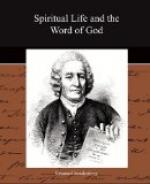V. The Three Senses in the Word
As there is a trine, one within another, in every last particular of the Word, and this trine is like that of effect, cause, and end, it follows that there are three senses in the Word, one within another, namely, a natural, a spiritual, and a celestial; a natural for the world, a spiritual for the heavens of the Lord’s spiritual kingdom, and a celestial for the heavens of His celestial kingdom. (That the entire heavens are divided into two kingdoms, the spiritual and the celestial, may be seen in Heaven and Hell, n. 20-28.) Now as there is one sense within another, a first which is the sense of the letter for the natural world, a second which is the internal sense for the spiritual kingdom, and a third which is the inmost for the celestial kingdom, it follows that a natural man draws from it his sense, a spiritual angel his sense, and a celestial angel his sense, thus everyone what is analogous to and in agreement with his own essence and nature. This takes place whenever a man who is led by the Lord is reading the Word.
But let this be illustrated by examples. When this commandment of the Decalogue is read, “Thou shalt honor thy father and thy mother,” a man in the world understands by “father and mother” a father and mother on the earth, and also all who are or may be in the place of father or mother; and by “honoring” he understands to hold such in honor. But an angel of the spiritual kingdom understands by “father” the Divine good, and by “mother” the Divine truth, and by “honoring” loving; while an angel of the celestial kingdom understands by “father” the Lord, and by “mother” heaven and the church, and by “honoring” doing.
When the fifth commandment of the Decalogue, “Thou shalt not steal,” is read, by “stealing” a man understands stealing, defrauding, and taking away under any pretense his neighbor’s goods. But an angel of the spiritual kingdom by “stealing” understands depriving another of his truths and goods by means of falsities and evils, while an angel of the celestial kingdom by “not to steal” understands not to attribute to himself the things that are the Lord’s, as the good of love and the truth of faith; for thereby good becomes not good, and truth not truth, because they are from men.
When the sixth commandment, “Thou shalt not commit adultery,” is read, a man by “committing adultery” understands committing adultery and whoredom, also thinking filthy thoughts, speaking lasciviously, and doing obscene things. But an angel of the spiritual kingdom by “committing adultery” understands falsifying the truths of the Word and adulterating its goods; while an angel of the celestial kingdom by “committing adultery” understands blaspheming against the Lord, heaven, and the church.




